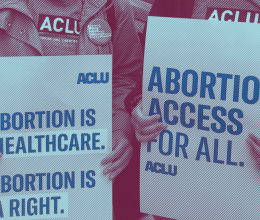
FOR IMMEDIATE RELEASE
CONTACT: Anna Núñez, Communications Coordinator, ACLU of Texas, 713-942-8146, ext. 110, [email protected]
AUSTIN – At a press conference today hosted by the ACLU of Texas, family members of Marlise Muñoz, along with Rep. Elliott Naishtat (HD-49), introduced HB 3183, or “Marlise’s Law,” a bill designed to give pregnant women and their families the same rights as every other Texan. Marlise’s Law would remove the pregnancy exclusions from Chapter 166 of the Health and Safety Code, which outlines the rights and procedures for end-of-life decision-making.
In 2013, 33 year-old Marlise Muñoz suffered a pulmonary embolism and was determined brain-dead by a Fort Worth hospital. Her family immediately requested removal of life support and the doctors refused, citing her 14-week pregnancy and a Texas state law that bars pregnant women and their families from making their own decisions about end-of-life care.
“Because of this onerous law,” said Terri Burke, executive director of the American Civil Liberties Union of Texas who opened the press conference, “Marlise’s parents were forced to sit by their dead daughter’s beside for two excruciating months until the courts forced the hospital to stop the machines and they could finally find peace.”
“When Marlise died, I did my best as a husband to fulfill her wishes,” said Erick Muñoz. “I don’t want to tell any family what to do in such a difficult time with such a private decision. I just want every family to have the right to make the best decision for them without interference from the government.”
"This bill would allow women autonomy when planning their wishes regarding extraordinary medical interventions during end-of-life care," said Rep. Naishtat, the bill’s sponsor. "Marlise’s Law enables physicians, health care providers and medical institutions to honor a woman's wishes and personal values, and preserve the doctor-patient relationship. This bill does not preclude a woman from receiving medical treatment."
The parents of Marlise Muñoz revealed the painful experience their family endured, stressing the need for women and their families to be given the respect necessary to trust in their decision-making process during end-of-life medical interventions.
“The state not only tied our hands, but those of the doctors and the hospital too,” said Lynne Machado, mother of Marlise Muñoz. “What should have been an immensely private and personal moment for our family was used as a political debate. The doctors weren’t practicing medicine, they were practicing politics.”
“During one of the most difficult moments of our lives, we took comfort in knowing that our family was united in this decision making,” said Ernie Machado, father of Marlise Muñoz. “We did what was best for Marlise and for our family, and we are proud of that. To quote Anthony Brandt, ‘Other things may change us, but we start and end with the family.’”
“Every Texan should be treated equally under the law,” said Burke. “We’re here today so that no woman or family will suffer the indignity of being treated as second-class citizens. Once the patient and her family decide what’s right for their situation, the law shouldn’t stand in the way. Marlise’s Law will repeal the harmful pregnancy exclusion and restore trust and dignity to all Texas families.”





